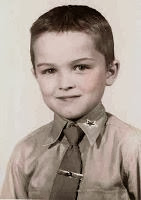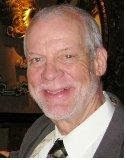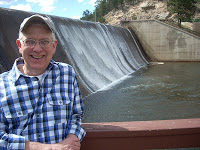Bravery can come in large or small packages. Some involve great deeds while other deeds involve only moderate or even insignificant events; any of which could be public or private.
The very first brave thing I can remember doing was also the first dumb thing I remember doing. Of course I didn’t know I was being brave or dumb; I was only 10; in the 5th grade and on my way home from school. In case you all have forgotten, I have a powerful attraction to ice cream. So strong it is that back then, if anyone had wanted to get into (and me out of ) my pants all they would have had to do was invite me to their place for ice cream, but no one knew that. You might have even seen me transform into an “ice cream-zombie”.
So, one particular week previous to my act of bravery, I had been stopping by the local grocery store where my parents shopped. I had left over lunch money and my purpose for stopping there was to buy an ice cream sandwich at a cost of 10-cents; eating it on my way home. More accurately, eating it within 20 feet of the door after exiting the store; sooner, if I could get it unwrapped while still walking to the exit.
The week following I had no left over lunch money but the attraction to ice cream was still as powerful as ever and I stopped by the store. I searched everywhere in my pockets and book binder while walking up and down the aisles but try as I might, I just could not find the money that was not there. So I became brave and dumb; I turned into a stupid kid. Carefully scanning for potential witnesses and hoping no one could hear my pounding heart, I quickly opened the ice cream cooler, removed one ice cream sandwich, placed it into my book binder and left the store.
I waited until I crossed the highway before I removed the thing, unwrapped, and ate it. On the bright side, I did throw the wrapper into a trash bin I was walking by; after all I’m no despicable litter-bug. The next four days found me doing the same thing before guilt overcame attraction. It is said by some that males think with two brains; or rather only one of the two actually thinks and the other just acts. But I learned from these experiences that males (especially boys) can hear the “siren call” of inanimate objects quite clearly, objects such as ice cream sandwiches, or firearms, or fast cars, or any baseball/football games in their vicinity or on a TV, or the call of a video game console.
This story does have an ending but not until 1969 after I joined a church while in the Air Force. I had carried my shoplifting guilt with me for all those years but it was not causing any problems until then. My homosexual acts didn’t bother me much but the shoplifting did as I joined the church. So, I wrote a letter outlining my theft, put it in an envelope along with $10.00 to cover interest on 40-cents over 10-years, and mailed it to the grocery store. I never heard back from the store, but I felt clean before God. Mailing that letter was the bravest thing I ever did out of two events to that point in my life.
The 2nd place bravest thing I had done up to 1969 occurred while I was working as a 16-year old staff member at Camp Winton, a boy scout summer camp. Our rival camp was Camp Harvey West located at the top of Echo Summit just 10 miles from my home at South Lake Tahoe. On one of my weekends off, I dressed in black and as dusk approached I set out alone to raid their camp.
I had made a white flag with the words, “Camp Winton is Best” and emblazoned it with our camp’s logo, back-to-back “W”s surrounded by a circle. It looked like two “X”s side by side but was really “W”s for the two Winton brothers; the logo of the Winton Lumber Company. The trail to the camp passed on the west side of Flagpole Peak. I climbed up to the peak where there was the stump of an old flagpole. On the west side the climb was very easy. At the end of the trail, I had to side step along a narrow ledge with both hands on the peak’s ridge to my front and a modest 50 to 100 foot cliff to my rear. As I closed in on the actual top where the flagpole was my hands had to be raised higher and higher.
I finally reached the top. At this point my arms were stretched out to their maximum length over my head. I couldn’t place my flag from this position, so I did another brave thing and another dumb thing. I grabbed the bottom of the flagpole and pulled myself up so I was straddling the peak with the pole between my legs. I was facing north. To my right was a shear 200-300 foot cliff, but it looked like a mile drop. To my left was that modest 50 to 100 foot drop which suddenly looked much farther than 100 feet.
I tied my flag to the pole, enjoyed the view for a minute or two and then decided that I’d spent enough time up here and since the sun was beginning to disappear, it was time to leave. I looked to my left to make sure I knew where to put my feet on the narrow ledge I’d arrived on but ….. the ledge was gone! Panic set in; it was getting dark and I had no way to get down; “½ a mile” drop on one side and a “two-mile” drop on the other. I sort of enjoyed the view for a couple more minutes before my brain calmed down and started thinking sense to me.
The ledge WAS really there, I just couldn’t see it because the peak was a little wider just above the ledge and narrowed to the top of the ridge I was dangling my legs on either side of. The traitorous sun kept setting and light was fading fast. I finally decided to trust my memory and swung my right leg over the ridge and ended up dangling over the left side of the ridge still hanging tightly to the pole. I still could not see or feel the ledge; a bit more panic followed until I remembered that my arms had to be fully extended before I could get up to the ridge in the first place, so I must be fully extended to get down. I relaxed my biceps and sure enough the ledge was there and I was able to return safely to the trail and complete my raid.
Lowering myself to the fullest extent of my arms is the 2nd place bravest thing I had done up to 1969. I have done other dumb things and brave things since 1969 but if I hadn’t found the courage to write that letter about the shoplifting, I doubt I would have ever found the courage to do the other brave things.
© 4 Mar 2014
About the Author
I was born in June of 1948 in Los Angeles, living first in Lawndale and then in Redondo Beach. Just prior to turning 8 years old in 1956, I began living with my grandparents on their farm in Isanti County, Minnesota for two years during which time my parents divorced.
When united with my mother and stepfather two years later in 1958, I lived first at Emerald Bay and then at South Lake Tahoe, California, graduating from South Tahoe High School in 1966. After three tours of duty with the Air Force, I moved to Denver, Colorado where I lived with my wife and four children until her passing away from complications of breast cancer four days after the 9-11 terrorist attack.
I came out as a gay man in the summer of 2010. I find writing these memories to be therapeutic.
My story blog is TheTahoeBoy.Blogspot.com




